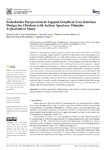Stakeholder perspectives to support graphical user interface design for children with autism spectrum disorder: a qualitative study

Use este enlace para citar
http://hdl.handle.net/2183/27887
A non ser que se indique outra cousa, a licenza do ítem descríbese como Creative Commons Attribution 4.0 International License (CC-BY 4.0)
Coleccións
- Investigación (FCS) [1293]
Metadatos
Mostrar o rexistro completo do ítemTítulo
Stakeholder perspectives to support graphical user interface design for children with autism spectrum disorder: a qualitative studyAutor(es)
Data
2021-04-27Cita bibliográfica
Groba B, Nieto-Riveiro L, Canosa N, Concheiro-Moscoso P, Miranda-Duro MDC, Pereira J. Stakeholder perspectives to support graphical user interface design for children with autism spectrum disorder: a qualitative study. Int J Environ Res Public Health. 2021 Apr 27;18(9):4631.
Resumo
[Abstract]
The development of digital supports for people with autism has increased considerably in recent years. Technology designers and developers have interpreted the needs and learning styles of people with autism in different ways. As a result, there are generic, non-specific or heterogeneous guidelines for the design and development of technology for people with autism. This study aims to identify and describe the recommended elements to support graphical user interface design for children with Autism Spectrum Disorder (ASD), considering the stakeholders’ perspective, engaged in a computer application development. A qualitative, longitudinal, multicentre study was carried out. A sample of 39 participants belonging to four groups of stakeholders participated: children with autism, family members, professionals with experience in the intervention with children with autism, and professionals with expertise in the design and development of assistive technology. The techniques used to formalise the collection of information from participants were semi-structured interviews and observation. MAXQDA 2020 software (Verbi Software, Berlin, Germany) was used to analyse the data. The result is a guide with suggestions to support an interface design that emerges from the stakeholder perspectives. This study provides useful information to offer alternatives for children with ASD and facilitate the understanding of daily life.
Palabras chave
Autism spectrum disorder
Children
Graphical user interface
Qualitative approach
Digital support
Assistive technology
Activities of daily living
Children
Graphical user interface
Qualitative approach
Digital support
Assistive technology
Activities of daily living
Versión do editor
Dereitos
Creative Commons Attribution 4.0 International License (CC-BY 4.0)
ISSN
1661-7827






